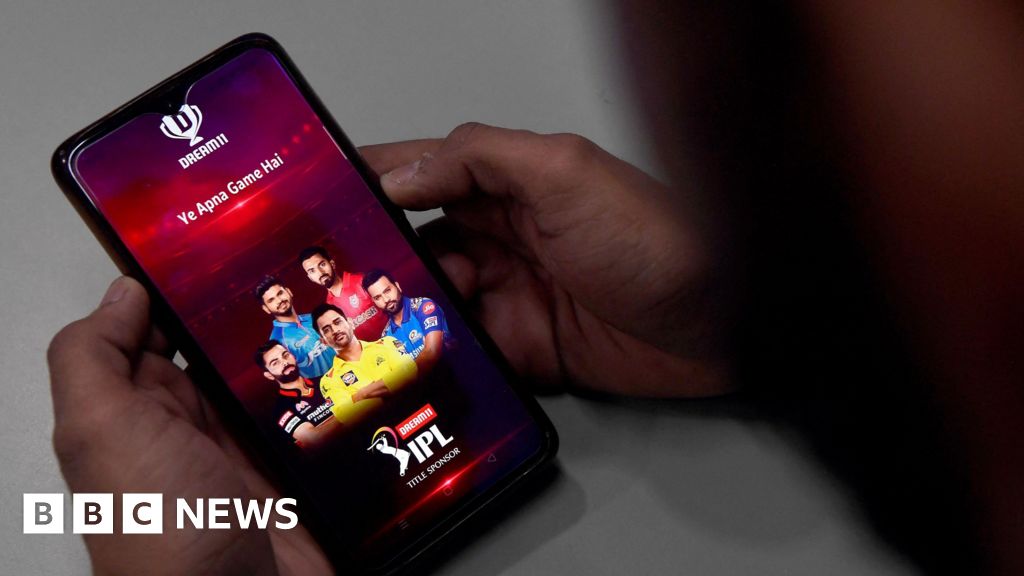Kartik Srinivas (name changed) still flinches at the mention of online betting. What began as a thrill to earn a quick buck spiralled into a five-year addiction that cost the 26-year-old his savings, peace of mind and nearly his future.
Between 2019 and 2024, Srinivas lost more than 1.5 million rupees ($17,000; £13,000). The money included three years of his earnings, as well as savings and loans from friends and family. I tried everything - apps, local bookies, international platforms. I was hooked, he says.
Srinivas' story reflects the darker side of India's once booming Real Money Games (RMG) industry - where players use online platforms to bet cash on poker, fantasy sports and other games. Days ago, India passed a bill to outlaw these games, arguing they had become increasingly addictive and were leading to financial distress among people.
The new law makes offering or enabling such services punishable, with a jail term of up to three years and a fine of up to 10 million rupees. Promoting them carries penalties of two years and 5 million rupees, though users are treated as victims, not offenders. The government has defended the move as a way to protect consumers from gambling.
Federal IT Minister Ashwini Vaishnaw stated online money games had harmed 450 million Indians, causing losses of over 200 billion rupees and triggering depressions and suicides among many. The source of this data, which was presented in parliament last week, is unclear.
But many in the industry have called the ban a knee-jerk move, which they say has crippled a thriving sector and would hurt those it is trying to protect. Before the ban, India had around 400 RMG startups that generated nearly $2.3 billion in annual taxes and supported more than 200,000 jobs. One of them, Dream11, even sponsored India's cricket team.
This is the first federal law to ban online betting platforms, though the sector has long faced scrutiny, with states like Odisha, Assam, Andhra Pradesh and Telangana already enforcing their own bans. Yet, the industry has flourished, attracting big global investments and celebrity endorsements.
Mumbai-based gaming lawyer Jay Sayta expressed that the ban was a massive setback for investors who had injected millions into these startups. He noted while there was a need for some regulation, the law was introduced in haste and without consultation. The most affected are Dream11 and My11Circle, which have shut real-money gaming operations due to the law.
The law has been criticized for not distinguishing between games of skill and games of chance. Some Indian high courts have previously classified online money games under the skill category, allowing them to operate legally.
While the government aims to eliminate online gambling, critics fear this move may push players to unregulated platforms, thus increasing risks. As the conversation about responsible gambling continues, many are left wondering what this new landscape will mean for India’s gaming culture.
Between 2019 and 2024, Srinivas lost more than 1.5 million rupees ($17,000; £13,000). The money included three years of his earnings, as well as savings and loans from friends and family. I tried everything - apps, local bookies, international platforms. I was hooked, he says.
Srinivas' story reflects the darker side of India's once booming Real Money Games (RMG) industry - where players use online platforms to bet cash on poker, fantasy sports and other games. Days ago, India passed a bill to outlaw these games, arguing they had become increasingly addictive and were leading to financial distress among people.
The new law makes offering or enabling such services punishable, with a jail term of up to three years and a fine of up to 10 million rupees. Promoting them carries penalties of two years and 5 million rupees, though users are treated as victims, not offenders. The government has defended the move as a way to protect consumers from gambling.
Federal IT Minister Ashwini Vaishnaw stated online money games had harmed 450 million Indians, causing losses of over 200 billion rupees and triggering depressions and suicides among many. The source of this data, which was presented in parliament last week, is unclear.
But many in the industry have called the ban a knee-jerk move, which they say has crippled a thriving sector and would hurt those it is trying to protect. Before the ban, India had around 400 RMG startups that generated nearly $2.3 billion in annual taxes and supported more than 200,000 jobs. One of them, Dream11, even sponsored India's cricket team.
This is the first federal law to ban online betting platforms, though the sector has long faced scrutiny, with states like Odisha, Assam, Andhra Pradesh and Telangana already enforcing their own bans. Yet, the industry has flourished, attracting big global investments and celebrity endorsements.
Mumbai-based gaming lawyer Jay Sayta expressed that the ban was a massive setback for investors who had injected millions into these startups. He noted while there was a need for some regulation, the law was introduced in haste and without consultation. The most affected are Dream11 and My11Circle, which have shut real-money gaming operations due to the law.
The law has been criticized for not distinguishing between games of skill and games of chance. Some Indian high courts have previously classified online money games under the skill category, allowing them to operate legally.
While the government aims to eliminate online gambling, critics fear this move may push players to unregulated platforms, thus increasing risks. As the conversation about responsible gambling continues, many are left wondering what this new landscape will mean for India’s gaming culture.





















